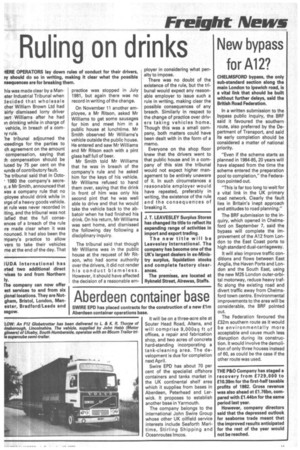Ruling on drinks
Page 7

If you've noticed an error in this article please click here to report it so we can fix it.
HERE OPERATORS lay down rules of conduct for their drivers, ay should do so in writing, making it clear what the possible nsequences are for breaking them.
his was made clear by a ManIster Industrial Tribunal when decided that wholesale cher William Brown Ltd had airly dismissed lorry driver Den Williams after he had )n drinking while in charge of vehicle, in breach of a corny rule.
be tribunal adjourned the Iceedings for the parties to ch agreement on the amount compensation, saying that :h compensation should be luced by 75 per cent on the iunds of contributory fault.
he tribunal said that in Octo1980 the company's secrey, a Mr Smith, announced that as a company rule that no iployee should drink while in arge of a heavy goods vehicle. at rule was never recorded in iting, and the tribunal was not :isfied that the full conseences of a breach of the rule ire made clear when it was nounced. It had also been the mpany's practice to allow vers to take their vehicles me at the end of the day. That practice was stopped in July 1981, but again there was no record in writing of the change.
On November 11 another employee, a Mr Ritson, asked Mr Williams to get some sausages for him and meet him in a public house at lunchtime. Mr Smith observed Mr Williams's vehicle outside the public house. He entered and saw Mr Williams and Mr Ritson each with a pint glass half full of beer.
Mr Smith told Mr Williams that he was in breach of the company's rule and he asked him for the keys of his vehicle. Mr Williams refused to hand them over, saying that the drink in front of him was only his second pint that he was well able to drive and that he would take the vehicle back to the abbatoir when he had finished his drink. On his return, Mr Williams was sent home, and dismissed the following day following a disciplinary inquiry.
The tribunal said that though Mr Williams was in the public house at the request of Mr Ritson, who had some authority over the drivers, it did not render his conduct blameless. However, it should have affected the decision of a reasonable em player in considering what penalty to impose.
There was no doubt of the existence of the rule, but the tribunal would expect any reasonable employer to issue such a rule in writing, making clear the possible consequences of any breach. Similarly in respect to the change of practice over drivers taking vehicles home. Though this was a small company, both matters could have been dealt with in the form of a memo.
Everyone on the shop floor knew that the drivers went to that public house and in a company of this size the tribunal would not expect higher management to be entirely unaware of it. In such circumstances a reasonable employer would have repeated, preferably in writing, the existence of the rule and the consequences of breaking it.
J. T. LEAVESLEY Surplus Stores has changed its title to reflect its expanding range of activities in import and export trading.
The new title will be Leavesley International. The company has become one of the UK's largest dealers in ex-Ministry surplus, liquidation stocks and complete factory clearances.
The premises, are located at Rykneld Street, Alrewas, Staffs.














































